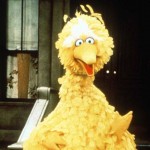
During his Oct. 3 debate with President Barack Obama, Republican presidential candidate Mitt Romney called for cutting federal funding to PBS, despite saying, “I love Big Bird.” His comment renewed a long-running debate over subsidies to public broadcasting.
“I’m going to stop the subsidy to PBS,” the former Massachusetts governor said during a deficit-cutting discussion. “I’m going to stop other things. I like PBS. I love Big Bird. I actually like you, too, Jim (Lehrer, PBS newsman and debate moderator). But I’m not going to … keep on spending money on things to borrow money from China to pay for it.”
PBS chief Paula Kerger said she “just about fell off the sofa” when the issue suddenly came up during the debate. She said that if the subsidy goes, so will some PBS stations.
Federal funding for the Corporation for Public Broadcasting totals $450 million this year, accounting for about 15 percent of the CPB’s budget, she said. Federal money supplements the budgets of PBS’s 179 stations nationally. For some of the smaller stations in rural areas, this subsidy accounts for more than half of its yearly budget, so many can’t operate without it.
See also:
New PBS deal could shake up video streaming market for schools
PBS KIDS Lab website offers new resources to help children build math skills
Considering Romney stressed the importance of education, Kerger said she hopes he realizes the extent of educational programming that PBS offers. Four out of five children under age 5 watch public television, where “Sesame Street” is a long-running hit, she said.
“To me, public television is like mom and apple pie,” she said. “Maybe it’s because I’m just too close to it. Maybe it’s because I talk to so many people for whom public television is a lifeline.”
But public broadcasting funding has been a frequent target of congressional Republicans, who believe PBS and National Public Radio favor liberal points of view.
“It is demoralizing to have our work put in the middle of this debate,” Kerger said. “We don’t belong here.”
The issue quickly became a hot topic on social media, where Twitter reported a peak of 17,000 tweets per second about Big Bird. The hashtag #SaveBigBird quickly sprouted up.
New York Times columnist Nicholas Kristof tweeted: “Hey, I figured out how Romney will balance the budget: sale of TV rights to broadcast the decapitation of Big Bird.”
And on the campaign trail the day after the debate, Obama seized on Romney’s comment to take a jab at his rival.
“When he was asked what he’d actually do to cut the deficit and reduce spending, he said he’d eliminate funding for public television. That was his answer. I mean thank goodness somebody is finally getting tough on Big Bird. It’s about time,” Obama joked at an Oct. 4 rally in Denver. “We didn’t know that Big Bird was driving the federal deficit. But that’s what we heard last night. How about that? Elmo, too?”
For several years, “Sesame Street” has produced videos and other materials for the Pentagon to help children deal with parents’ absences during tours of duty, as well as other stresses suffered by the children of troops. Asked at a Pentagon briefing whether the Defense Department wants to see its relationship with the program continue, press secretary George Little sidestepped the question.
“I will say that we’ve had a long-lasting and effective partnership with ‘Sesame Street’ and they have supported military children,” Little said. “But I’m not going to get into politics here—I wouldn’t want to ruffle any feathers, so to speak.”
See also:
New PBS deal could shake up video streaming market for schools
PBS KIDS Lab website offers new resources to help children build math skills
Sesame Workshop, the producers who make “Sesame Street,” noted that while it is not part of PBS, it depends on the stations to distribute its work.
“Sesame Workshop is a nonpartisan, nonprofit educational organization,” said Sherrie Westin, Sesame Workshop spokeswoman. “We do not comment on campaigns, but we’re happy we can all agree that everyone likes Big Bird.”
Update: PBS issued the following statement after the debate…
“We are very disappointed that PBS became a political target in the presidential debate last night. Gov. Romney does not understand the value the American people place on public broadcasting and the outstanding return on investment the system delivers to our nation. We think it is important to set the record straight and let the facts speak for themselves. The federal investment in public broadcasting equals about one one-hundredth of one percent of the federal budget. Elimination of funding would have virtually no impact on the nation’s debt. Yet the loss to the American public would be devastating.
“A national survey by the bipartisan research firms of Hart Research and American Viewpoint in 2011 found that over two-thirds of American voters (69%) oppose proposals to eliminate government funding of public broadcasting, with Americans across the political spectrum against such a cut.
“As a stated supporter of education, Governor Romney should be a champion of public broadcasting, yet he is willing to wipe out services that reach the vast majority of Americans, including underserved audiences, such as children who cannot attend preschool and citizens living in rural areas.
“For more than 40 years, Big Bird has embodied the public broadcasting mission—harnessing the power of media for the good of every citizen, regardless of where they live or their ability to pay. Our system serves as a universally accessible resource for education, history, science, arts, and civil discourse.”
- ‘Buyer’s remorse’ dogging Common Core rollout - October 30, 2014
- Calif. law targets social media monitoring of students - October 2, 2014
- Elementary world language instruction - September 25, 2014


Comments are closed.